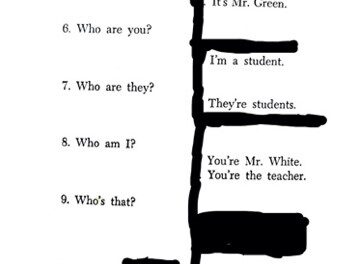 The summer issue is here! In an effort to save on shipping, and because our out-of-the-way attic office affords us lots of quality time with the sizable population of campus birds, we’ve decided to send issues via pigeon post. Though our dry runs were largely unsuccessful (and not especially dry), we finally figured out that tying the issues to the birds’ feet alarms them, whereas fashioning volume 8, number 1 into stylish British wedding hats results in a desire to fly far and wide and preen like mad, then preen some more. If you find random copies of CR strewn around your local parks and city plazas, or if a puffed-up pigeon turns up in your wedding chapel wearing a literary chapeau, you’ll know vanity won out over centuries of training. It happens.
The summer issue is here! In an effort to save on shipping, and because our out-of-the-way attic office affords us lots of quality time with the sizable population of campus birds, we’ve decided to send issues via pigeon post. Though our dry runs were largely unsuccessful (and not especially dry), we finally figured out that tying the issues to the birds’ feet alarms them, whereas fashioning volume 8, number 1 into stylish British wedding hats results in a desire to fly far and wide and preen like mad, then preen some more. If you find random copies of CR strewn around your local parks and city plazas, or if a puffed-up pigeon turns up in your wedding chapel wearing a literary chapeau, you’ll know vanity won out over centuries of training. It happens.
If an issue does arrive on your doorstep, we hope you’ll enjoy it. In the meantime here’s some bonus material from contributors Jeff Gundy, Cindy Beebe, and Jessica Hollander about their work in the new issue:
Jeff Gundy: I saw the slogan “free beer tomorrow” in a bar a while back, chuckled, then almost forgot it. But somehow the goofy promise of it stuck with me, and I tried it out as the refrain for “March Ode,” a spring poem that’s all about the goofy persistence of hope in the face of so much darkness and disaster. Once I was in the realm of miraculous gifts like free beer, it seemed like child’s play to envision all the small and large frustrations and problems of my life and the world at large suddenly resolved or transformed. There is indeed a lot of play in the poem, including (as some readers surely will notice) a lot of playing with religious language and imagery. I mean no irreverence, only the kind of revelry in words that, some days, makes me believe, though it’s hard to say in what, exactly.
Cindy Beebe: During a poetry workshop I attended a few years ago, I was privileged to hear B. H. Fairchild speak of “the too-muchness of the world” and how it must be given voice. I couldn’t agree more. Always, and everywhere, especially in mundane and unexpected places, I find there is something a bit “too much” to ignore, some fact or aspect that endears, or surprises, or in some way begs my attention—for example, the time my father pulled me aside and declared that my aunt has a naked man in her garage. I knew immediately that a poem—which eventually became “My Aunt Has a Naked Man in Her Garage”—was coming.
Jessica Hollander: A couple years ago I read Lorraine Delia Kenny’s “Daughters of Suburbia,” a study about white suburban teenage girls. Everything in these girls’ lives had the potential for dramatic narrative, and the most successful (popular) girls were good story tellers, swapping elaborate stories of their suburban suffering (where life was “soooo boring” that they had to make it interesting themselves). Kenny describes an instance where one of the popular girls inspired an infectious dramatic episode: She got sick in gym class, triggering several of her friends to get sick too. And they all went to the nurse, and their parents were called, and the cafeteria exploded in gossip, and these girls all gained a sort of social currency from this psychotic, groupthink frenzy. The event was so disturbing and ripe with complicated symbolism that I knew I had to write a story where an iteration of it would take place. I wanted “Like Falling Down and Laughing” to be about people’s obsession with story-making, about the desire to have our lives follow some sort of narrative, and about the frenzy created around the female body as a landscape for enacting social narratives.
The Cincinnati Review is available for order through our secure online form.










